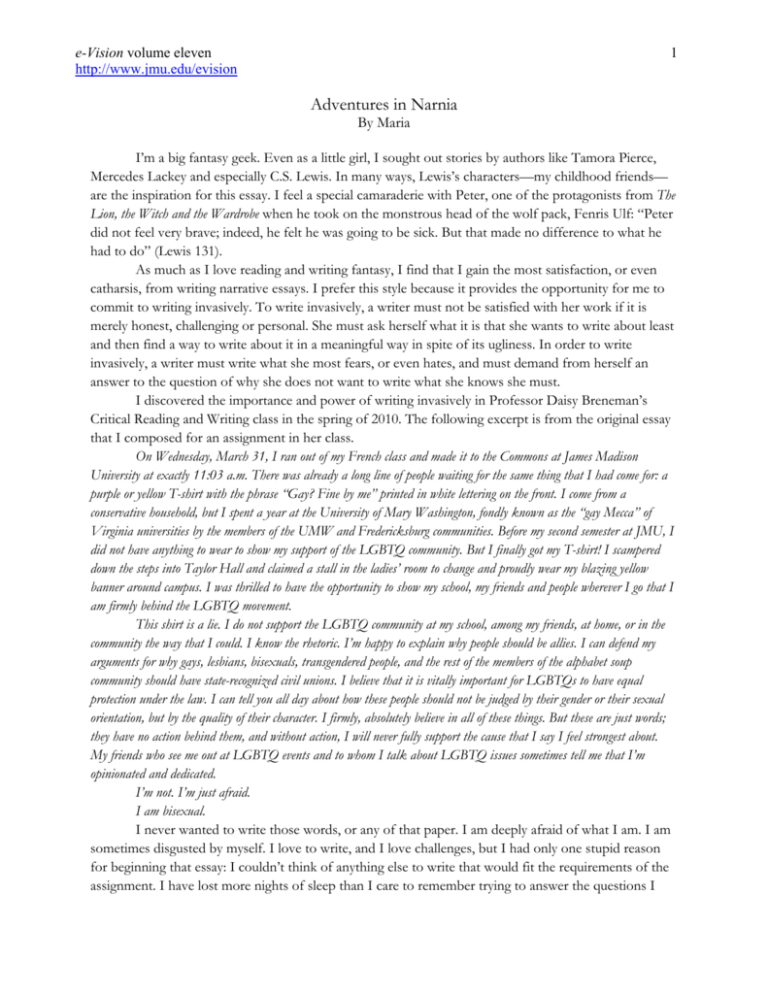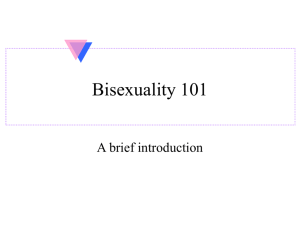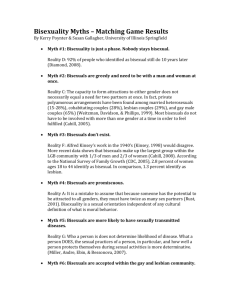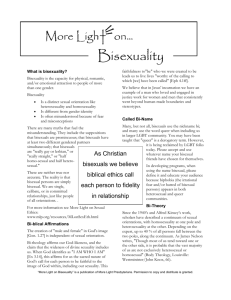
e-Vision volume eleven
http://www.jmu.edu/evision
1
Adventures in Narnia
By Maria
I’m a big fantasy geek. Even as a little girl, I sought out stories by authors like Tamora Pierce,
Mercedes Lackey and especially C.S. Lewis. In many ways, Lewis’s characters—my childhood friends—
are the inspiration for this essay. I feel a special camaraderie with Peter, one of the protagonists from The
Lion, the Witch and the Wardrobe when he took on the monstrous head of the wolf pack, Fenris Ulf: “Peter
did not feel very brave; indeed, he felt he was going to be sick. But that made no difference to what he
had to do” (Lewis 131).
As much as I love reading and writing fantasy, I find that I gain the most satisfaction, or even
catharsis, from writing narrative essays. I prefer this style because it provides the opportunity for me to
commit to writing invasively. To write invasively, a writer must not be satisfied with her work if it is
merely honest, challenging or personal. She must ask herself what it is that she wants to write about least
and then find a way to write about it in a meaningful way in spite of its ugliness. In order to write
invasively, a writer must write what she most fears, or even hates, and must demand from herself an
answer to the question of why she does not want to write what she knows she must.
I discovered the importance and power of writing invasively in Professor Daisy Breneman’s
Critical Reading and Writing class in the spring of 2010. The following excerpt is from the original essay
that I composed for an assignment in her class.
On Wednesday, March 31, I ran out of my French class and made it to the Commons at James Madison
University at exactly 11:03 a.m. There was already a long line of people waiting for the same thing that I had come for: a
purple or yellow T-shirt with the phrase “Gay? Fine by me” printed in white lettering on the front. I come from a
conservative household, but I spent a year at the University of Mary Washington, fondly known as the “gay Mecca” of
Virginia universities by the members of the UMW and Fredericksburg communities. Before my second semester at JMU, I
did not have anything to wear to show my support of the LGBTQ community. But I finally got my T-shirt! I scampered
down the steps into Taylor Hall and claimed a stall in the ladies’ room to change and proudly wear my blazing yellow
banner around campus. I was thrilled to have the opportunity to show my school, my friends and people wherever I go that I
am firmly behind the LGBTQ movement.
This shirt is a lie. I do not support the LGBTQ community at my school, among my friends, at home, or in the
community the way that I could. I know the rhetoric. I’m happy to explain why people should be allies. I can defend my
arguments for why gays, lesbians, bisexuals, transgendered people, and the rest of the members of the alphabet soup
community should have state-recognized civil unions. I believe that it is vitally important for LGBTQs to have equal
protection under the law. I can tell you all day about how these people should not be judged by their gender or their sexual
orientation, but by the quality of their character. I firmly, absolutely believe in all of these things. But these are just words;
they have no action behind them, and without action, I will never fully support the cause that I say I feel strongest about.
My friends who see me out at LGBTQ events and to whom I talk about LGBTQ issues sometimes tell me that I’m
opinionated and dedicated.
I’m not. I’m just afraid.
I am bisexual.
I never wanted to write those words, or any of that paper. I am deeply afraid of what I am. I am
sometimes disgusted by myself. I love to write, and I love challenges, but I had only one stupid reason
for beginning that essay: I couldn’t think of anything else to write that would fit the requirements of the
assignment. I have lost more nights of sleep than I care to remember trying to answer the questions I
e-Vision volume eleven
http://www.jmu.edu/evision
2
have about myself and about how to incorporate my sexual orientation into part of my larger identity. To
do this, I force myself to explore my time in the closet, in Narnia, and to pick over the living document
that this essay has become. I do it for myself, because I have a deeply personal stake in every word that I
put on this page. I am not writing about a hobby or a historical figure. I am writing about something that
I learned to ignore, hate, and fear about myself, and once I submit these pages to you, I can’t take them
back.
To you, who cannot see me or know me, I am the words on this page, for better or for worse. If
I am only the words on the page, there is nothing that is more important than making them the right
words.
I dedicate myself to this work because, like Peter, even though I am afraid, I know that I must
find the words that will defeat my monstrous Fenris Ulf, the personification of the guilt, disgust, fear and
shame that I feel because of my sexual orientation. I dedicate myself to this work because I hope that I
am not the only one who will find some absolution from guilt, fear and self-denial somewhere in its
lines.
Before I began, I didn’t even look at Fenris Ulf. He snarled so loudly that I threw up my hands
and said that he could do what he liked. I imagined that he wasn’t there at all, and in time, we got used to
one another. I almost forgot that he was there at all. When the girls in my high school gathered around
me and my group of friends, shouting at us that we were gay and that we were going to hell, I ran away,
sobbing and enraged, but entirely certain that they were wrong about my sexual orientation—almost. I
made myself forget that I had confessed four years earlier to another friend that Fenris Ulf was breathing
down my neck. I knew, even then, and I couldn’t admit it.
It was easy for me to pretend to be straight. I used to wish that I were. I convinced myself that I
was. Then, I identified as an ally to gays, lesbians, bisexuals, transsexuals and the whole alphabet soup of
identities. I love them because they are fantastic, brave and strong for being out, and for being an
example of how they’re regular, real people. But back then, bisexuality in me wasn’t what it was in other
people.
I thought it was okay in everybody else, but not in me.
That feeling is monstrous.
I spent the first two weeks of work on that essay crying over it. I worked until I saw traces of
dawn on the day the paper was due, but when I looked at the shriveled thing that I had written, the draft
that I intended to turn in to my professor, I knew that I was hiding from what I was trying to say. I was
distancing myself from the heart of the paper, the monstrous heart of the problem, that ugly word,
“bisexual.” I refused to claim it for myself. Back then, if I could have chosen, I would have wanted to
just be simple, straight and normal.
I was not yet writing invasively, because I was not able to face my fear.
I came to class with my most recent draft of the assignment and turned it in, but after class I
went to Daisy’s office hours. I told her that I wasn’t satisfied with my work, and that in the end, I shied
away from talking about myself; instead of exploring something deeply personal and acknowledging my
sexual orientation, I had written a furious rant against a nebulous stereotype. It fulfilled the requirement
for the assignment, but it was an empty, unsatisfactory straw-man argument. The paper, as it stood,
didn’t enact change, not even in myself. I wanted to do it right, and I told her so.
“Then give it to me when it’s finished,” she said with a little smile, and handed the paper back to
me.
e-Vision volume eleven
http://www.jmu.edu/evision
3
I didn’t know if I wanted to cry or if I wanted to hug her. I think I did both. I didn’t want to
touch that paper any more. I wanted it to be done with. I was afraid of it, because when you write
something down or when you say it, you make it real. You can’t hide from it anymore. You have to face
it, and, like Peter, that’s what I was forcing myself to do.
But I knew, deep down, that was what I wanted, sort of. I wanted to make it right.
Daisy is one of the most remarkable professors I’ve had the privilege of studying with. She is
infamous for never, ever giving extensions, except perhaps in the rarest of circumstances when a student
is hospitalized or an immediate family member dies. Those poor souls usually have an extra day, if she is
feeling quite generous.
Daisy gave me five more days to complete my paper.
In five days, I reconstructed that essay into something worth representing me to an audience. It
still was a far cry from perfect. I expressed the fears that I had about what others might think about me
by attacking those people, instead of just admitting that I was afraid. I still ranted against stereotyping.
However, the final draft that I turned in was a new creature altogether, one that had seen drastic
improvements from the shivering, wet, pathetic thing I would have submitted without the extension.
I’ve learned from that earliest edition of my essay, though. I needed a constructive, safe place to
begin, from which I could branch out, correct myself and discover truths about myself and about others
that I need to find for myself. I began this process of self-identification in my original essay by attacking
people who uphold beliefs and stereotypes that say that
bisexual men and women are obsessed with sex, that they are really lesbian or gay, they
are indiscriminate about their sexual partners, unable to control their sexual appetites,
and that, if such a thing as “bisexuality” exists, it’s a clear, simple, equal attraction to men
and to women. (“Fact and Information Sheet”)
In the original essay that I handed in for class, I especially attacked the “college bisexual” or
being “bicurious.” These are words that are common enough in a college student’s vocabulary and have
similar meanings. A “college bisexual” is someone, usually a woman, who claims a bisexual identity in
college, is indiscriminate with her sexual partners, who are both men and women, and who is
promiscuous. She uses the word “bisexuality” to describe her actions. However, once this student
graduates, she claims that she has decided that she is straight and is thus able to re-assimilate into our
heterosexist culture and the adult world smoothly. The “bicurious” college student is similar, but does
not claim to be bisexual. Instead, he or she uses the word “bicurious” to explain that the student thinks
that he or she might be bisexual, and is willing to “experiment” through casual sex with people of the
same sex. Once again, this leads to promiscuity. Like the “college bisexual,” the “bicurious” student
frequently rejects the bisexual identity upon graduation and returns to a heterosexual life.
In that original essay, I argued that these labels—these false, assumed identities—become an
insider’s pass to sexual promiscuity and deviance without forfeiting the privileges associated with
heterosexuality. However, these same labels, which I argued do not represent the “real” bisexual, are
those that create the popular, negative image of bisexuality today. I argued that these faked identities
destroy the reputation of people like me who seek to claim bisexuality as a legitimate sexual identity. I am
not sexually promiscuous, and I am only sexually deviant inasmuch as I am attracted to women and to
men, yet I was terrified to identify myself as bisexual because of the stereotypes that go along with
bisexuality because of the “college bisexual” and “bicuriousity.”
e-Vision volume eleven
http://www.jmu.edu/evision
4
But I was wrong.
Today, I acknowledge that there are probably some people who help create and perpetuate the
popular image of bisexuality by calling themselves “bicurious” and “college bisexuals.” However, I see
now that my original essay was written with an enormous amount of fear of others. I wrote about
stereotypes that I was afraid were true and about labels that I didn’t want to be true, not about truth.
The truth is that some of those stereotypes are true for some bisexuals. Bisexuality is just a word
for a sexual orientation. Sexual orientation does not subsume identity, and one’s sexual orientation is
only one factor in determining one’s sexuality, the way that one relates one’s sexual orientation to others.
People are just people, and they make the choices that they do for better or for worse. Sexual identity is
important, but it is only one small part of what goes into making the choices that make us the people we
are. It is not only unfair for me to deny someone else the right to claim a bisexual identity because I fear
or dislike their decisions, it is also just plain wrong.
In the original essay, I made the mistake of not fully acknowledging that bisexuals can and often
do decide to fulfill the stereotypes about them. I was afraid of acknowledging that truth, because I
thought that if I did, I would be seen as one or more of those stereotypes. I feared that if I admitted that
some of the stereotypes are true for some bisexuals, I would no longer be able to argue effectively for
my sexual identity because my audience would imagine that I had some kind of kinky, deviant sexual
proclivities.
Today, I think “bicurious” might be a legitimate sexual identity, and I think that being a “college
bisexual” might be part of finding a genuine sexual identity. After all, it has taken me years of denial, guilt
and hard work to allow myself to self-identify as bisexual. In casual conversation, I still don’t use the
word to describe myself. If asked, I prefer to say that I am “not straight” or “a member of a sexual
minority.” I worry that people will misunderstand me. I think that means that I’m still afraid to use the
ugly word. Writing this essay has been a huge part of my process of self-identification, but not everyone
writes for the same reasons that I do. I think identifying as “bicurious” can be someone else’s way of
finding his or her own identity, just like this essay is for me. Most importantly, I recognize that there is
no list of characteristics that makes a “real” bisexual; sexual orientation is a very personal process of selfidentification that can change over time, which is what makes it so complicated and so hard to
understand.
I know that I should not be threatened by the bicurious or the college bisexuals, because I am
the only person who, in the end, has control over my reputation. The quality of my character should be
judged by others based on the choices that I make, not by the choices of my peers. I will not live in fear
because of my sexual identity. People will think of my sexual orientation as they will, and I cannot
control what they think any more than I can control what college bisexuals or bicurious people do. My
sexual orientation is only a part of who I am. If I am dismissed by others because of it, without further
attention to the rest of the beliefs and decisions that make me the woman I am, I refuse to allow my selfesteem to be damaged by that unfortunate error. I am the sole trustee of my reputation, and my words,
beliefs and actions will suffice to speak for the truth of who I am.
I admit that I made a mistake when I condemned the bicurious and the college bisexuals. Now, I
can no longer deny my peers the right to develop and claim their own sexual identities because of my
fears, prejudices and judgments on their moral characters. If I do that, I make the same mistake that I
fear people make when they look at me. What if people claim to be “bicurious” not to obtain a license to
do what they please, but because they are afraid to fully admit the truth, just like I am?
e-Vision volume eleven
http://www.jmu.edu/evision
5
The closet is an insidiously comfortable place, a place where we can hide away on rainy days.
Sometimes our fantasies help us avoid reality, as the Pevensie children did when they escaped the
violence of World War II and the terror of the changing world around them, and retreated through the
wardrobe into Narnia. Sometimes, like the Pevensie children, we linger in our fantasies and wish that we
could stay forever. We try to forget that Narnia isn’t real. We forget that it is a beautiful fantasy, but a
dangerous lie. Yet we, like Peter, Susan, Edmund and Lucy, must leave Narnia and live our lives where
we belong: outside of the wardrobe.
My fear convinced me that Narnia wasn’t a bad place to stay. Now, I believe that if I want to be
seen as something different, I need to show it, to talk about it, and to live it as much as I dare. I need to
dare more every day. I need to fight my monsters back. I need to come out of Narnia and face the real
world, and writing invasively is helping me do that.
C.S. Lewis writes,
As it was—though all this happened too quickly for Peter to think at all—he had just
time to duck down and plunge his sword, as hard as he could, between the brute's
forelegs and its heart. Then came a horrible, confused moment like something in a
nightmare. He was tugging and pulling and the Wolf seemed neither alive nor dead, and
its bared teeth knocked against his forehead, and everything was blood and heat and
hair. A moment later he found that the monster lay dead and he had drawn his sword
out of it and was straightening his back and rubbing the sweat off his face and out of his
eyes. He felt tired all over. (131-2)
This is my victory.
I am bisexual.
Maria would like to thank Professor Daisy Breneman in James Madison University’s School of Writing, Rhetoric, and
Technical Communication and Dr. Sara Hirst, formerly of JMU’s Counseling and Student Development Center, for their
countless, tireless hours of support throughout her coming out process. Maria hopes to reach out to other LGBTQ students,
young adults, allies and parents through her work and is more than willing to share her experiences with those people. She
can be reached through Professor Breneman at brenemdl@jmu.edu.
Finally, Maria would like to dedicate this publication to her loving, wonderful parents, to whom she remains closeted, and
to all parents, in the hope that they might one day find common ground with their beloved children.
Works Cited
“Fact and Information Sheet About: Bisexuality.” Safe Zone. James Madison University, Harrisonburg,
VA, n.d. Web. 11 Apr. 2010. <http://www.jmu.edu/safezone/wm_library/
Bisexuality%20Fact%20Sheet.pdf>.
Lewis, C. S. The Lion, the Witch and the Wardrobe. 1950. New York: HarperCollins, 1994.
e-Vision essays copyright © 2011. All rights revert to individual authors.
All authors have granted permission for use in instructional purposes only.








